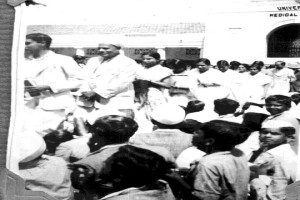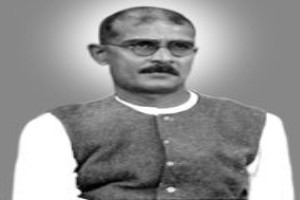
History Recalled
 By Mahadev Desai*
By Mahadev Desai*
A graduate of the Bombay University, full of beans and intellectual ambition, J.P. Bhansali came to Gandhiji when Non-cooperation was at its height. He had thrown up a research scholarship and became a lecturer in the National College. In the ordinary course he found his way to jail, where he learnt to outlive the habits of his delicate upbringing, and came out fired with a spiritual ambition.
The late Shyamji Krishna Varma , his uncle, intending him to succeed him, asked him to go to Europe. He did go but returned as soon as he went, sick of all that the West had shown him, and began his experiments in spiritual research. He stayed on in our midst for some years, went on periodical fasts, on the last occasion fasting for 55 days, and then one day left us, sick alike of all that we had shown him. He tortured the flesh to the extent of sewing up his lips and wearing nothing but an iron belt round his groin, and begged from door to door.
Also read: History Recalled: When Mahatma Gandhi visited Sir CV Raman
Some months ago Gandhiji saw him during the Harijan tour. He had been silent for years and would not speak but he owned that the spiritual kinship with Gandhiji was now, if anything, stronger. Three or four months ago he wrote a post card to Gandhiji to say that he intended walking to Wardha to see Gandhiji, that he had decided to break his silence only to talk to Gandhiji, and that he would cover the distance in some months.
Doubting Thomases like the present writer feared that in view of Gandhiji’s uncertain programmes the meeting would never take place. But evidently the recluse Bhansali had no such doubts and he came, sure enough. Bare-bodied and bare-footed, he had walked all these months, without anything on earth to call his own. He came and sat down in our midst, again one of us and yet so unlike us. He had no questions to ask, no curiosity to satisfy. All that was on our side. He would eat corn flour with water and neem leaves, if someone gave them to him, and sat in a corner of our room disturbing none, disturbed by none. But if he had conquered all curiosity, we had not, Gandhiji had not; and twice after evening prayers, Gandhiji asked him to come and reply to his questions as he wrote them. After three years he opened his lips.
“Does this diet suit you?”
“Quite.”
“Perhaps the neem leaves are a great help?”
“Undoubtedly. In winter I have to drop them, as these limbs have a rheumatic tendency.”
“Don’t you find the leaves too bitter?”
He laughed. “Well, there are varieties even among neem trees, and while some leaves are very bitter, some are not. The palate gets accustomed to this diet, so much so that it relishes it. There again crops up the question of the control of the palate!”
“And where do you sleep? You have nothing to spread or cover yourself with.”
“Just where I chance to be, and have just what I chance to get.”
“You won’t mind a mattress and a bed sheet and a wrap?”
“No. But I have slept often under the trees, often on bare earth and under the open sky, and often on the burning-ground.”
“Ever troubled by dangerous reptiles or animals?”
“Hardly ever. I was once stung by a scorpion, but it was no more than an insect bite. Snakes I have come across and once a leopard, but none of them meant any harm and there was no fear in me.”
“Any queer experiences on the burning (cremation)-ground?”
“I must own that there is a species of disembodied beings, but one need not believe in them. I have met them, and that is the fear that some times lurks in me. But soon I pull myself together.”
“Do you have to speak, if only to beg for your flour?”
“No.”
“Do you manage to get it always?”
“No. I have often had to go without any food. Once for three days running I had no food. Whilst some would willingly feed me, some have doubted my bona fides, – some have taken me to be a cheat, and some a member of the C.I.D.”
“Do you think of any of your old friends or relations that were once a source of worry to you?”
“Never. All memory is gone.”
“Does the grinding poverty of the villagers oppress you?”
“Rather. That reminds me of all you have written about it. I think of some of the most heart-moving of your writings like ‘Death Dance’ in Young India, and feel that the ‘Death Dance’ is going on, more relentlessly if possible, and feel that I have no right even to the handful of flour I eat. I am glad that I do not rob them any more, and the living presence of Death in the burial ground is somewhat of a consolation.”
“Then, you will someday come back home and yet fulfill my cherished dream about you? Won’t you?”
“I wish I could say it. I do not know. God alone knows. May be, there is a lingering chance.”
“What do you think of the whole day?”
“I have my mantras which I constantly repeat. Nothing disturbs me, nothing worries me.”
“Then all fear is gone?”
“Indeed. I swim in the ocean of peace. All that is due to you. You taught me all this. I have forgotten most of my past, but not the discourses on the Gita you used to give us, nor your discourses on “Pilgrim’s Progress.” Undisturbed peace is my privilege. Sleep practically untroubled by dreams. I have been often held up to ridicule and contempt. I have rejoiced in it and often craved for it. All I now want is the extinction of even that craving. Why should I rejoice over ridicule if I do not rejoice over praise? Undisturbed equanimity I want – that equability to praise and blame and heat and cold. I wish, if I could, not to delight even in travail. But what a dandy I used to be, Bapu! Oh the days of my dandyism! It is the mind that makes a heaven of hell and hell of heaven. There is no end to my peace now, and yet what a dandy I used to be once!” With this he laughed a hearty laugh.
“Where do you sit all day?”
“Downstairs, in the room. Friends come and go. I am perfectly untroubled and peaceful. I do not even know who comes and goes.”
“That is real victory,” said Gandhiji.
At this we left our pilgrim brother, with whom mentally at any rate we had traveled to the reaches he had attained. Whether the peace that passeth understanding is his we do not know, but here is no doubt that like John Bunyan, the renowned pilgrim, he has found the peace that he has in the knowledge that
He that is down needs fear no fall,
He that is low, no pride;
He that is humble ever shall
Have God to be his guide.
To continue…
*Mahadev Desai was an eminent freedom fighter and Mahatma Gandhi’s personal secretary; article courtesy his grandson, Nachiketa Desai.





